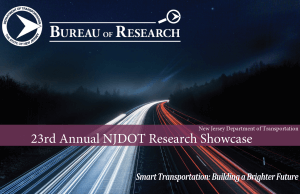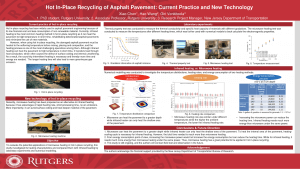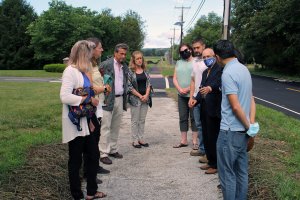
The 23rd Annual NJDOT Research Showcase highlighted innovative research in the state that is helping to build a smarter and brighter transportation future.
The 23rd Annual NJDOT Research Showcase was an opportunity for the New Jersey transportation community to learn about the broad scope of academic research initiatives underway and share technology transfer activities being conducted by institutions of higher education partners and their associates.
The 23rd Annual New Jersey Department of Transportation (NJDOT) Research Showcase brought together academic institutions, researchers, and partners across the state to share and discuss innovations in smart transportation and building a brighter future.
The virtual event ran from 9 am to 2:45 pm on October 27, including a morning session that saw a keynote speech from the NJ Governor’s office and a panel of presenters representing state agencies, academia, and industry who discussed the current call to action and next steps in electrification of vehicles, smart transportation and energy use.
In the afternoon, breakout sessions on Energy/Electrification, Infrastructure, Smart Transportation, and student-research poster sessions took place — providing an opportunity for attendees to discuss and ask questions about ongoing projects.
Noting that transportation makes up a large percentage of greenhouse gas emissions, Jane Cohen, Executive Director of the New Jersey Governor’s Office of Climate Action and the Green Economy, kicked off the NJDOT Research Showcase stressing the need for coordination among state agencies and researchers to focus efforts toward smart and sustainable transportation solutions such as electric vehicles and complete streets.

Rutgers student Xiao Chen won the 2021 Best Poster Award at Research Showcase for his project “Hot in-Place Recycling of Asphalt Pavement: Current Practice and New Technology.
Panelists from the New Jersey Department of Environmental Protection, NJDOT, Princeton University, Audi of America, and the Alliance for Automotive Innovation then discussed the current call to action and next steps in electrification of vehicles, smart transportation and energy use.
Andrew Tunnard, Assistant Commissioner of Transportation Operations Systems and Support at NJDOT, and Dr. Alain Kornhauser, Professor of Operations Research & Financial Engineering at Princeton, discussed a collaborative study on New Jersey fleet electrification that is determining locations for the state to build-out EV infrastructure including the cost/benefit analysis comparing EV charging infrastructure, and more.
Also in the morning session Amanda Gendek, Manager of the NJDOT Bureau of Research, presented the 2021 NJDOT Research Showcase awards. CAIT researchers Dr. Hao Wang and Dr. Husam Najm won the 2021 NJDOT Research Implementation Award for their project, “Implementation of Pervious Concrete for Sidewalks.”
Porous, or pervious, concrete is one type of green infrastructure that can provide environmental benefits in areas prone to flooding as its innovative design allows water to pass through it, effectively reducing flooding, puddling, and assisting groundwater recharge.
This summer, officials and residents in Montgomery Township, NJ celebrated the opening of a new pathway that incorporates this porous concrete design into a 2-mile trail along Skillman Road connecting pedestrians and residents to parks and recreation in the area. This was done as part of the pilot project between NJDOT, CAIT, Montgomery Township, and the Federal Highway Administration (FHWA).
Dr. Najm said that the more commonly used impervious concrete does not allow water to seep through, so in areas prone to flooding that can result in puddling and stormwater runoff. The porous concrete used in this installation incorporates larger size aggregate and has a rougher texture than traditional concrete that allows water to flow through it, protecting the area from flooding and stormwater runoff, puddling, and replenishing the ground underneath.
“We built different types of porous sections along the pathway in order to study and learn how the different mixtures behave in a real world environment,” Dr. Najm said. “While pervious concrete is generally made up of cement, water and sand, certain segments here contain different levels of sand and we believe this will give us new insight on the range of service life, environmental benefits, and life cycle costs.”

Dr. Husam Najm showed Montgomery Twp. officials the new pathway made with innovative pervious pavement. Photo ©Montgomery Township.
Rutgers students were also recognized during the Research Showcase. Wei Huang won the 2021 Outstanding University Student in Transportation Research Award for his work on the Implementation of Porous Concrete for Sidewalks in New Jersey project. Also, Rutgers student Xiao Chen won the 2021 Best Poster Award for his project “Hot in-Place Recycling of Asphalt Pavement: Current Practice and New Technology.”
Other awards included NJ Transit winning the Build a Better Mousetrap Award in the state agency category, and Montgomery Township winning in the local agency category. Learn more about the 2021 NJDOT Build a Better Mousetrap Award winning projects here.
In the afternoon, concurrent break-out sessions for research presentations on Energy/Electrification, Infrastructure, Smart Transportation, and student-poster presentations took place. Researchers described their methods and findings on ongoing and recently completed projects, and responded to questions by attendees.
Read more about the 23rd Annual NJDOT Research Showcase, and watch recordings of the presentations here.

